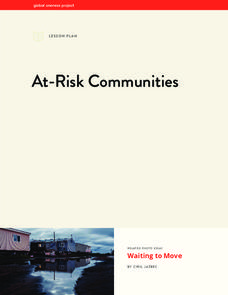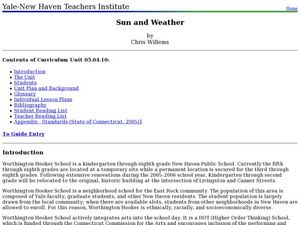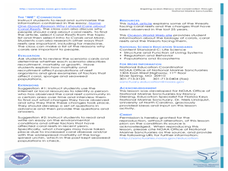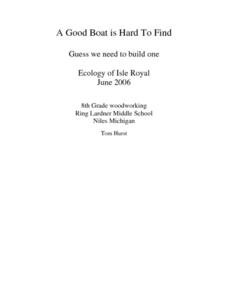Teach Engineering
Constructing Sonoran Desert Food Chains and Food Webs
Investigate desert biomes by creating food chains and food webs. Groups first research feeding habits of organisms in the Sonoran Desert. This information helps pupils draw food chains and webs to determine relationship between organisms.
Global Oneness Project
At-Risk Communities
"Waiting to Move," a photo essay by Ciril Jazbec, brings into sharp focus the threats posed by climate change. Class members examine images of Shishmaref Island and the Native Alaskan Inupiate coastal villages that are impacted by rising...
Curated OER
Let's go to the Video Tape!
Using actual data from a deep-sea video survey, high school marine biologists consider the biodiversity, compare species richness between two communities, and learn to calculate the diversity index. The lesson plan is all-inclusive,...
Curated OER
Praire Biome Models
Fifth graders, in groups, list the physical characteristics of a biome and think of ways in which animals might have to adapt to live there and make a biome mobile ball that show the different types of habitats that shape the praire biome.
Curated OER
Sun and Weather
How is the Earth's weather created? Middle schoolers will explain how the Sun's energy is transformed into different forms. They will perform mathematical calculations of volume, mass, and temperature. They they will explain the...
Montana Natural History Center
Studying Grassland Ecosystems
At first glance, grassland ecosystems might seem dull and uninteresting, but once you start to explore it's amazing the things you'll find! Through this series of engaging lessons, activities, and experiments, elementary students examine...
Energy for Keeps
Renewable Energy Action Project: What's in Your Energy Portfolio?
Uncover the renewable energy potential in your region. The activity outlines an approach to research current practices and trends. Learners conduct surveys to assess the attitudes of the local population and prepare a paper summarizing...
Curated OER
THE FARMER CARES FOR THE LAND
Students will identify cause and effect relationships in issues relating to Agriculture and the environment.Ask students to describe what farmers do. Then ask students to define the word "environmentalist." Ask students if they have...
Curated OER
California Biodiversity
Students examine several maps of California exhibiting features such as precipitation, topography, and vegetation. They look for patterns that might be the source of or influence biodiversity in different regions. They pay particular...
Curated OER
Seas Of Life
Students brainstorm examples of predator and prey that are featured in a video they watch. In this investigative lesson students will research an animal from the video and explain if it is a predator or prey and how it helps...
Curated OER
The Environments of Big Sur -- Which Do We Protect?
Students investigate the geological, climatic, and biological features of Big Sur. They watch a video, conduct Internet research, and create a script and images in the form of an outline in a simulation of an environmental group.
Curated OER
Blue Planet: Open Ocean
Students research facts about animal species. For this ocean lesson students view a video, prepare illustrated cards and create a food-web display.
Curated OER
Dependence and Interdependence
Third graders explore the dependence and interdependence that plants and animals in every environment have on one another. They examine how plants and animals depend on each other for survival. Students complete a variety of experiments...
Curated OER
Soil: Food Mapping
Students examine the concept of food mapping . In this agriculture lesson plan, students explore food and agriculture systems in the United States in the past and today. Students complete food mapping activities.
Curated OER
Ecosystems: A Home By Any Other Name
Students can learn more about the parts of ecosystems through exploration and hands on activities.
Curated OER
The Changing Coral Reef
Students record changes in the composition of a coral reef. In this Coral Reef lesson, students recognize the needs of Coral Reef species to survive. Students chart changes in population over time. Students write an essay...
Curated OER
Eco Points Score Card
Students play a game in which points are assigned to daily activities which require fossil fuels or electricity. They compare the impact their energy and transportation choices have in everyday life.
Curated OER
The Gaia Hypothesis: An Approach to Problem Solving in the Environment
Learners are introduced to the Gaia hypothesis by examining a conceptual sketch. In groups, they analyze the way they can use Dewey's method for problem solving to solve problems within the environment. They are given a problem facing...
Curated OER
COMPOSTING: WHY BOTHER?
Students explore the composting process and participate in a contest to make the most compost the fastest from the school's kitchen and yard waste.
Curated OER
FOREST GRUMP: Examining How Deforestation Affects Plants and Animals of the Canadian Boreal
Students consider definition of an ecosystem as it relates to the Canadian boreal, discover how deforestation affects this forest and recreate ecosystems. They write persuasive letters urging politicians or business people to help save...
Curated OER
The Dirt on Worms!
Fourth graders make predictions, observe, collect and record data. They investigate several soil and worm websites. Finally, 4th graders write a letter to The President which defends earthworms by explaining their value to the United...
Curated OER
100% Recyclable
Seventh graders research recycling activities at schools across the country using e-mail. They research the waste management and recycling program at their school and problem solve to create an environmentally sound program for the future.
Curated OER
Exploring the Great Salt Lake
Third graders participate in a scavenger hunt, looking for things that are unique about the ecosystem in and around the lake. They observe and describe a variety of habitats and distinguish living and nonliving elements of...
Curated OER
A Good Boat is Hard To Find
Eighth graders design and construct a safe and efficient human powered watercraft that can be used on a trip on the Great Lakes. Students utilize math and measurement skills to design and cut the pieces for their boat. Working in...

























